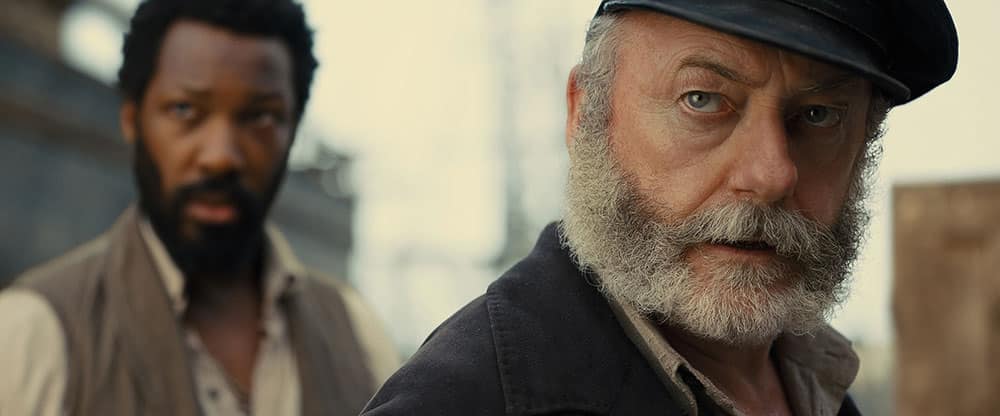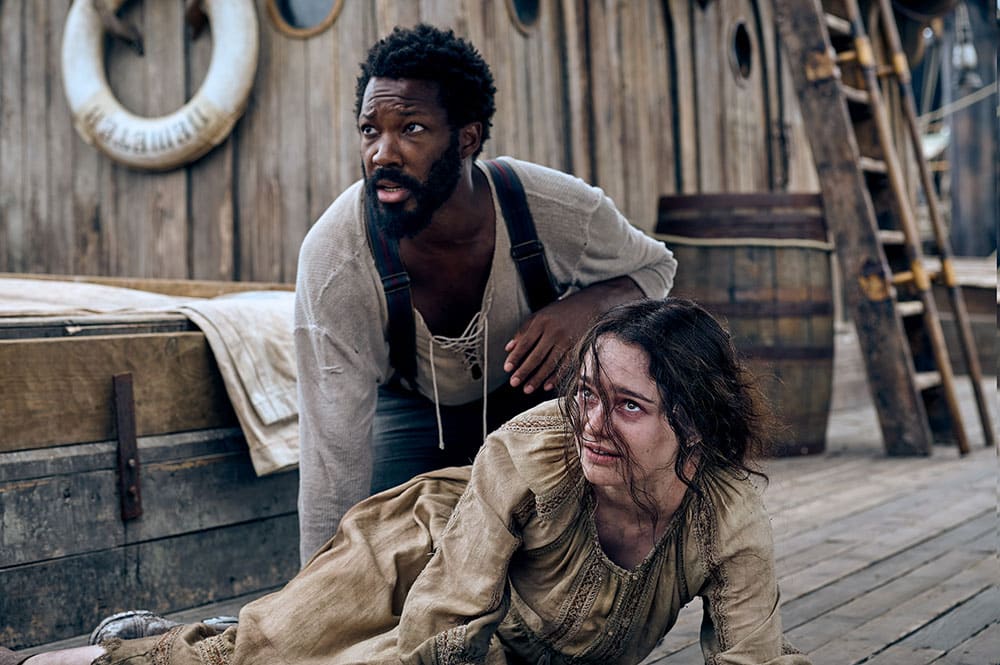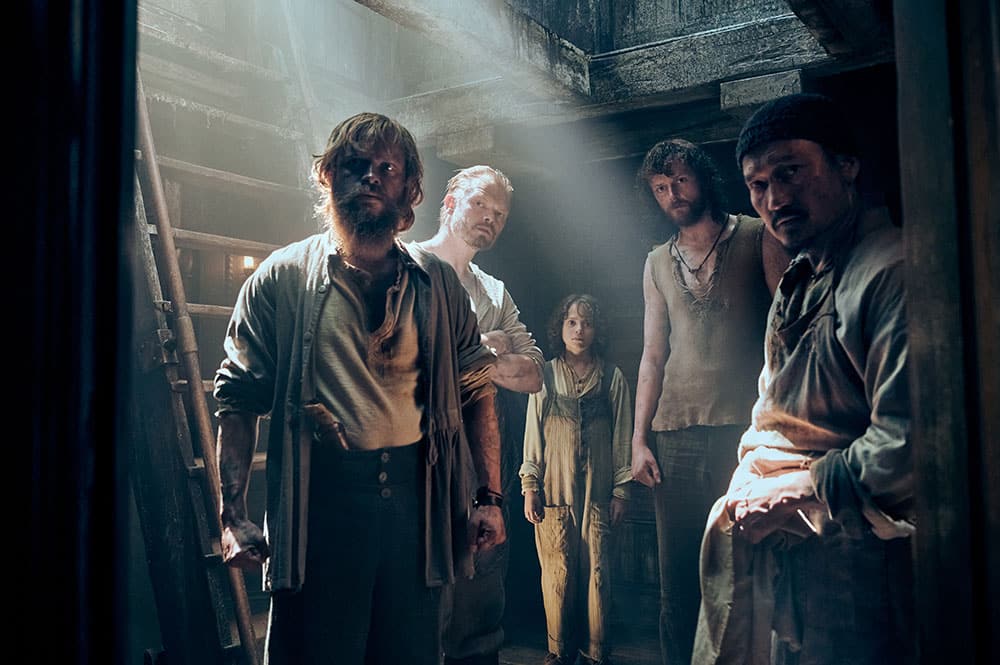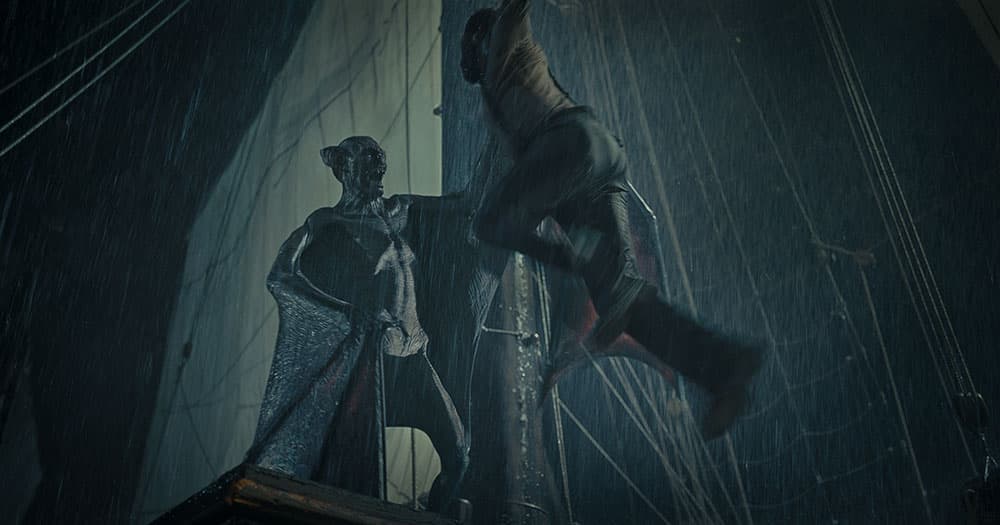“The Last Voyage of the Demeter” is a dark and compelling, albeit predictable, ode to the standard-bearing horror movies of yesteryear.
By all rights, a movie like The Last Voyage of the Demeter shouldn’t exist. With the unmitigated disaster that was 2017’s The Mummy (Universal’s doomed attempt at a shared Monsterverse) still pungent after six years, studio executives were likely leery of any foray back into that pool. Add to that mix a director unused to having a decent budget, sparse source material, and a cast of great (but hardly trending) character actors, and this ship could have gone down with all hands.
But a funny thing happened on the way to the harbor.
The Last Voyage of the Demeter is actually good. Like, really good.
Rotten Tomatoes has the synopsis as follows:
Based on a single chilling chapter from Bram Stoker’s classic novel Dracula, The Last Voyage of the Demeter tells the terrifying story of the merchant ship Demeter, which was chartered to carry private cargo–fifty unmarked wooden crates–from Carpathia to London. Strange events befall the doomed crew as they attempt to survive the ocean voyage, stalked each night by a merciless presence onboard the ship. When the Demeter finally arrives off the shores of England, it is a charred, derelict wreck. There is no trace of the crew.
Directed by André Øvredal, who also gifted us with Trollhunter, The Autopsy of Jane Doe, and Scary Stories to Tell in the Dark, The Last Voyage of the Demeter clocks in at one hour and fifty-eight minutes and is rated R for bloody violence.
Bottom line up front: this movie is very much a return to the more monstrous iteration of vampire lore, sidestepping bloodsuckers that sparkle or spoof, hewing more towards the feral Nosferatu interpretation as opposed to the campy version found in Renfield.
(Not that Renfield was a bad movie, but this reviewer will always prefer gothic Drac to hokey Drac.)
And boy, howdy does The Last Voyage of the Demeter nail the gothic aesthetic.
With a drab (by design) palette, subdued performances, simple but effective sets, and a slowly ratcheting sense of dread, it is nearly the antithesis of most studio-driven offerings.
It honestly surprises me when Hollywood releases a movie like this; these mid-budget horror/thrillers are practically guaranteed to earn critical scorn. Hell, just taking the quickest of glances at Rotten Tomatoes, the vast majority of their “top critics” took issue with the film in nearly every way.
One even went so far as to lambast the movie’s title, complaining that it gives away the ending. Everyone is entitled to their opinion, of course, but anyone who’s read Dracula, or possesses even rudimentary knowledge of the story, knows how The Demeter’s tale ends. Was that same critic shocked when the evil dead rose in Evil Dead Rise? Maybe it blew her mind that there was a death on the Nile in the movie of the same name.
But I digress…
In nearly every aspect, The Last Voyage of the Demeter pays homage to old-school films and old-school filmmaking. André Øvredal isn’t looking to shock and awe; he wants to ratchet up tension while delivering gothic goodness. The joy is in the telling (and showing), not in slinging some unexpected twist.
I firmly believe that to TRULY love cinema (and not just movies in general), one needs to appreciate the films that paved the way for modern moviegoing.
While there were plenty of older films with twists and turns (Hitchcock, anyone?), quite a bit of what was popular were the tales that folks already knew and were comfortable with. Maybe they were retold with a better budget, more serious actors, or some other contrivance that hadn’t been tried before. For many, going to the movies was about the spectacle, not the surprise. I mean, Robin Hood always triumphs over the Sherriff of Nottingham, doesn’t he?
That said, The Last Voyage of the Demeter could have used a little more in the way of narrative creativity.
My one major complaint is that if you’ve seen even a handful of Hollywood movies, you can pretty much anticipate nearly every plot point and “box check” that takes place here.
The man of God, admonishing everyone that their sins have wrought their fate? Check. The man of science arguing that everything has to have a logical foundation? Check? Heroic sacrifices and last-minute changes of heart? Check and mate. Again, not every movie film needs to be The Sixth Sense, but the by-the-numbers storytelling does the movie no favors.
In almost every other category, however, The Last Voyage of the Demeter succeeds.
The source material, a single chapter from Bram Stoker’s Dracula titled The Captain’s Log and told in an epistolary format (like the rest of the book), was very good at setting a terrible scene while being vague enough to allow for creative license. This translates very well to the screen.
Occasional voiceovers from The Demeter’s Captain tie the film to the original story without being obtrusive, and a sense of isolated hopelessness pervades nearly every minute of the runtime. After all, when you’re thousands of miles from land, how can you possibly escape?
The character actors acquit themselves well, with the standouts being Liam Cunningham (as Captain Eliot), Corey Hawkins (as Clemens, a British doctor), and David Dastmalchian (as Wojcheck, The Demeter’s first mate).
Cunningham brings his usual charm and gravitas, playing a character not far removed from Davos Seaworth from Game of Thrones. He looks the part, he sounds the part, and his understated performance dovetails nicely for the “aging man of the sea” character. In some time and genre-hopping fanfic, he and Capt. Jack Aubrey from Master and Commander are sharing a drink, swapping tales of their oceanic voyages.
As a temporary addition to the crew, Corey Hawkins serves as the audience’s proxy for the unfolding events, attempting to apply logic to an illogical situation. He has a natural charisma which makes him easy to root for.
David Dastmalchian has one of the harder roles to fulfill, that of the stoic and largely grumpy first mate. The character is very much a “just do your jobs, and we’ll be fine” character, but Dastmalchian imbues just enough nuance behind his eyes and in his expression to sell Wojcheck’s quiet desperation.
The other thespians embody their roles with gusto, and there’s not a bad performance among them.
Kudos must also be given to Javier Botet for bringing the bestial Dracula to life. The decision to go as practical as possible with the creature is the right choice, helping to make him feel like a real menace.
And I would be remiss if I left out The Demeter. The ship is essentially a character unto itself, all forbidding corridors, creaking spars, and flapping masts.
Some movies could only wish for this kind of built-in dreadful atmosphere.
And yes, one could argue that this is essentially Alien, except in the late 1800s and on a boat. In fact, I think that there are currently memes aplenty for that very thing. But, seeing as how Dracula came out over 100 years ago, it would be more accurate to say that Alien is The Captain’s Log, but in space.
Another minor quibble, but likely just mine personally, is that when held up to a movie like Master and Commander, where the H.M.S. Surprise was essentially a fully functioning vessel that the actors practically lived on, the occasionally CGI’d Demeter doesn’t always sell the illusion of being a truly tactile place. However, I can also not expect every seafaring movie to occur on a real vessel.
At nearly two hours, the runtime might be long, but this is a tightly scripted offering, with only a handful of slight deviations from the primary plot.
(Clemens’ struggles as a black doctor in a field dominated by white men and the mores and superstitions of sailors, especially when a woman is aboard their vessel, are among the changes.)
This also isn’t a jump scare kind of film, preferring to rely upon a ubiquitous sense of dread.
Bear McCreary’s soundtrack also gets a nod.
No, it’s nothing groundbreaking, and you likely won’t be humming any of the tunes after the credits roll, but it marries perfectly to the events unfolding on the screen. The orchestral swells and jump-scare screeching might be old hat by this point, but this is the kind of movie where such flourishes belong.
Oh, and the movie pulls no punches with its death toll, with a couple of filmmaking “cardinal sins” committed.
(I’ll throw that out there now so that it’s been addressed; it was the right decision considering the tale being told, but some people will have a hard time with it. Ye have been warned.)
Ultimately, what you get out of The Last Voyage of the Demeter will be largely determined by what you bring with you as you purchase your ticket. If you understand that the film is taking place within an established framework, and is beholden to a foregone conclusion, then I think you’ll be pleased with the results. But, if you’re expecting a wildly different take on the source material or some eleventh-hour denouement that changes everything, this is not your port of call.
Atmospheric and bleak, The Last Voyage of the Demeter successfully steers the vampire tale away from the romantic and silly offerings that have largely dominated the genre, returning to the monstrous roots from whence it came.
I, for one, was glad for the change of scenery. Highly recommended.



















Follow Us!